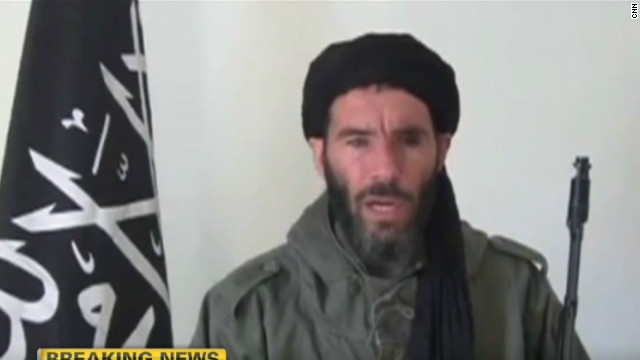
The man claiming
responsibility for the operation is a veteran jihadist who is also
renowned for hostage-taking and smuggling anything from cigarettes to
refugees.His name is Moktar Belmoktar, an Algerian who lost an eye while fighting
in Afghanistan in his teens and has long been a target of French
counter-terrorism forces.Today, he leads a group called Al-Mulathameen Brigade (The Brigade of
the Masked Ones), which is associated with al Qaeda in the Islamic
Maghreb (AQIM.) In the last few years, he has cultivated allies and
established cells far and wide across the region.
Assault on In Amenas
The gas complex where
Belmoktar's followers
struck at dawn Wednesday is in a region that has
seen plenty of jihadist activity in recent years, in part because of the
collapse of government authority across the Libyan border, just 50
kilometers (31 miles) from In Amenas.
Counter-terrorism experts
differ as to how the attackers - in several pickup trucks - may have
reached In Amenas, but there are several roads and tracks across
uninhabited desert from Libya. On the other side of the border, a
patchwork of militia prevails rather than any government presence.
A spokesman for
Al-Mulathameen told Mauritanian news websites that the attack was in
retaliation for Algeria permitting French overflights as part of the
intervention in Mali. But regional analysts believe it was too
sophisticated to have been planned in days.
Robert Fowler, a former
Canadian diplomat who was abducted by Belmoktar's followers in Niger in
2008 -- and met the man himself -- told CNN, "I suspect they have an
intelligence wing and they are constantly looking for ways to grab
westerners and embarrass the West and confuse our options. And that's
exactly what they are doing."
In a 28-minute video
that appeared on jihadist forums last month, Belmoktar warned that
Al-Mulathameen would soon act against Western interests in the region.
"This is a promise from us that we will fight you in the midst of your countries and we will attack your interests," he said.
Announcing the formation
of an elite commando unit called "Those Who Sign With Blood," Belmoktar
said it would be the shield against the "invading enemy."
Wednesday's attack in
Algeria was claimed in the name of that unit, which Belmoktar said would
include "the best of our youth and mujahideen, foreign and local
supporters."
Counter-terrorism
analysts tell CNN the language suggests this group was dispatched to
carry out an act of jihad rather than abduct foreigners for ransom.
"This feels much more
like attacks staged in the past by other al Qaeda affiliates, rather
than another attempt to exchange hostages for ransom, as has often been
AQIM's practice," said Andrew Lebovich, a long-time observer of AQIM
currently in Senegal.
"Belmokhtar likely wants
to show he is still engaged in active operations and he is not moving
away from the fighting - especially at a time when other Jihadists are
in active combat against French troops in Mali," he said.
But it is also possible that Belmoktar may try to bargain for the release of al Qaeda operatives held in Algerian jails.
In his December message,
he said, "To our captive people...it is our promise and our debt as
long as we live that we will liberate you, and we sacrifice our lives
for you and everything we own to free you."
Three al Qaeda
operatives were detained last July by Algerian security services, but
it's not known whether they were close to Belmoktar.
Marlboro Man
Born in 1972, Belmoktar grew up on the edge of the desert in southern Algeria.
He traveled to
Afghanistan in 1991 in his late teens to fight its then Communist
government. He returned to Algeria as a hardened fighter with a new
nickname "Belaouar" -- the "one-eyed" -- after a battlefield injury, and
joined forces with the Armed Islamic Group (GIA) in its brutal campaign
against the Algerian regime and civilians deemed to be its supporters.
Belmoktar later claimed he met al Qaeda founder Osama bin Laden in the Sudan in the mid 1990s.
According to Jean-Pierre
Filiu, a French scholar who has extensively studied AQIM, Belmoktar
rose steadily through the ranks to become the GIA commander for the
Sahara.
After a popular backlash
against the terrorist group in Algeria, Belmoktar switched allegiance
to a spin-off group -- the GSPC -- in 2000, and continued to operate in
the sub-Saharan region.
The GIA was the
forerunner of AQIM, which still counts many Algerians in its leadership.
Belmoktar remains associated with this fissiparous group -- but is very
much his own man.
Abdelmalik Drukdal, the
overall leader of AQIM, is said to have demoted Belmoktar late last year
from his position as 'Emir of the Sahel.' Belmoktar also feuded with a
rival commander - Abou Zeid - one of the most violent and radical
figures in AQIM. More than most al Qaeda affiliates, AQIM is divided
into often competing groups.
Citing regional security
officials, Agence France Presse reported Belmoktar had been dismissed
for "continued divisive activities, despite several warnings."
Libyan sources tell CNN
that Belmokhtar spent several months in Libya in 2011, exploring
cooperation with local jihadist groups, and securing weapons supplies.
One Arab media report -
cited in a US Federal Research Division report last year - said
Belmoktar had attended an event organized by Wissam ben Hamid, an
Islamist commander, in the town of Sirte. There is no way to verify
that.
More recently, his center of operations was the dusty town of Gao in northern Mali.
Another offshoot of AQIM
known as the Movement for Unity and Jihad has taken over Gao and
introduced Sharia law, including public amputations and floggings.
To make money,
"Belmoktar increasingly engaged in smuggling, earning the popular
nickname 'Mr. Marlboro' ... he also was involved in the smuggling of
drugs, weapons, and illegal immigrants," Jean-Pierre Filiu in a 2010
Carnegie Paper.
No comments:
Post a Comment